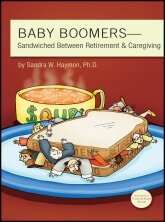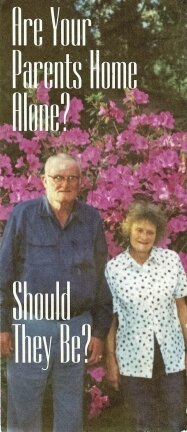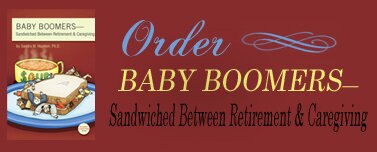Table of Contents

Baby Boomers—Sandwiched Between Retirement & Caregiving by Sandra W. Haymon, Ph.D.
Click image for larger view. |
Experience is what you get when you don't get what you want.
(Dan Stanford)
Section One: Caregiving
If all difficulties were known at the outset of a long journey, most of us would never start out at all.
(Dan Rather with Peter Wyden in "I Remember")
Oh No! Not Alphabet Soup Again!
Dr. Haymon gets a second helping of alphabet soup. This time it is served by financial planners rather than healthcare providers. The alphabet fragments/acronyms in this bowl (AT/TX, PT/TD, IRAs, ROTHs, MUNIs, SEPs,) remind her of similar fragments in the alphabet soup served to her by medical and legal professionals when she was the caregiver for her elderly parents.

Sandra's mother and step-father, Carl and Mildred Williamson, 1996
Click image for larger view. |
Caring For Elderly Loved Ones
Learn how caring for elderly loved ones was handled in the past, how this is presently being handled, and speculations about how this may be handled in the future. Don't be caught off guard when it's your turn to care for an ill or elderly loved one.
Our Turn
Many baby boomers may be required to take several turns at caregiving, and these turns could occur simultaneously. Learn from the experiences of others how to be better prepared when it becomes your turn.
Overview of My Turn
Dr. Haymon offers an abridgement of her personal encounters while taking care of her mother and stepfather. In a very honest and forthright manner, she openly discusses her turn in hopes others will learn and benefit from her experiences.
Section Two: Becoming Aware Before You Get a Wake-Up Call
To think too long about doing a thing often becomes its undoing.
(Eva Young)
Red Flag Checklist
Are your elderly loved ones home alone? Should they be? Assess the situation before you and they are in crisis. Use the enclosed Red Flag Checklist to evaluate your loved ones' cognitive, physical, general, and social level of functioning, as well as their ability to handle money matters. There is also a critical checklist that screens for potential endangerment to self or others and an alcohol specific checklist, which uncovers alcohol related problems. Don't ignore indicators suggesting your elderly loved ones are no longer safe living alone.
Denial
Learn to recognize and confront common myths and denial mechanisms you may possess about your elderly loved ones' ability to care for themselves. Don't ignore early warning signs that could cost your loved ones or others their lives.
One Phone Call Changed Everything
Dr. Haymon shares events that shocked her out of her denial regarding her parents' ability to safely live alone. Identify red flags that may be leading up to your wake-up call.
Section Three: Facing Emotional Challenges
One of the most dangerous forms of human error is forgetting what one is trying to achieve.
(Paul Nitze)

Sandra's biological father, Pat Haymon, waiting to go on dialysis, 1981
Click image for larger view. |
Feelings Checklist
Validate and normalize your feelings with this checklist of over one hundred emotions reported as common by many caregivers. This checklist will help you appreciate the breadth and complexity of emotions you may experience while caring for your loved ones. A noticeable negative slant may indicate you are experiencing depression, anxiety, and/or grief issues.
Emotional Issues of the Caregiver
Understand the toll caregiving could take on you physically, emotionally, mentally, and spiritually. Exchange being overwhelmed for making clear decisions. Learn how to get off the emotional rollercoaster of depression, frustration, anger, and fear. Eliminate guilt-change should to could. Learn how to exercise your personal power and how to transcend counterproductive emotions so that you may have peace and joy in your life.
Emotional Issues of Other Family Members
Consider how your caregiving role could impact other family members. Learn to make decisions that are in the best interest of your family, not just what's best for your elderly loved ones. Explore ways to include your siblings, spouse, adult children, and grandchildren in the caregiving process. Discover ways to encourage family members to talk about their feelings and how to handle emotions appropriately.
Emotional Issues of the Elderly
Individuals may grieve many losses during the final stage of life-their sense of personhood and identity, physical and mental health, lifelong relationships, and often their very homes. Many also experience end-of-life concerns, worries, and fears. Learn how to engage in empathic presence and how to help elderly loved ones find value and meaning in their lives. Empower them to resolve past issues, to forgive, to accept forgiveness, and to set goals for this final stage of life.

Carl and Mildred just prior to Carl's death in 1998. Both suffered from Alzheimer's Disease.
Click image for larger view. |
Closure-Saying Good-bye
Discover ways to say good-bye before and after the death of loved ones. Learn how to resolve unresolved issues appropriately before it's too late. Find strength through forgiveness and comfort in loving and being loved. Give loved ones permission to die. Consider the notion that relationships don't end with death.
Section Four: Making Choices and Decisions
When you have to make a choice and don't make it, that is in itself a choice.
(William Young)
Medical Choices and Advance Directives
Consider healthcare choices and make informed decisions in advance. A medical crisis in an E.R. is not the time or place to make end-of-life decisions or determine whether you can legally make decisions for elderly loved ones. Examine the pros and cons of CPR, feeding tubes, and artificial respiration. Advance directives such as Do Not Resuscitate Orders (DNRs), Do Not Hospitalize Orders (DNHs), Living Wills, Durable Power of Attorney (DPOA), and others are explained in clear, easy-to-understand language. Decide which ones are appropriate for you and your loved ones.
Living Arrangements
Consider various care options and living arrangements: in-home assistance, adult day care, assisted living facilities, nursing homes, and Alzheimer's units. Review important considerations prior to moving an elderly loved one into your home. Understand your loved one's needs and level of functioning. Gain confidence in your choice of care options and living arrangements.
Assistance Programs
Explore numerous assistance programs. Gain a better understanding of Medicare Parts A (Hospital Insurance), B (Medical Insurance), C (Advantage Plans), and D (Drug Benefit Program); HMOs, PPOs, and POSs; Medicaid; Optional Supplemental Income (OSI); Supplemental Security Income (SSI); Veteran's (VA) benefits, and others.

Pat visiting Sandra's mother at an Alzheimer's facility, 2002
Click image for larger view. |
Section Five: Preparing for Retirement
Retirement should be based on the tread, not the mileage.
(Allen Ludden)
Baby Boomers Retire
Review the history and present status of Social Security. Gain a clearer understanding regarding the mishandling of Social Security funds. Examine probing questions and consider possible solutions to problems associated with our present Social Security system.
Silver Tsunami Expected to Hit with a Vengeance
Understand the domino effect that will be created as 78 million baby boomers, America's Silver Tsunami, turn 62 over the next two decades (ten thousand every day) and vacate their positions in the US workforce. The annual trillion dollar question is: How will the mega costs, associated with Social Security, Medicare, and healthcare for baby boomers be funded? Explore possible answers.
Are There Enough Eggs in Your Basket?
Answer probing questions to determine if you are financially ready for retirement and learn ways you might become even better prepared. Discover ways to avoid unnecessary income taxes, estate taxes, and probate. Compare retirement investments-IRAs, SEPs, ROTHs, 401Ks, and others, as well as variable, fixed, and indexed annuities. Clarify the differences between qualified and non-qualified plans. Learn more about trusts, wills, and other valuable documents that could help you manage and preserve your estate. Review important considerations regarding long-term care insurance.
A Dress Rehearsal Before You Retire
Plan a dress rehearsal before you retire. Learn how to get your finances in order as well as how to anticipate and project retirement expenditures. Answer retirement questions that could help you prepare for the type of retirement you've dreamed of.
Where will Boomers Choose to Live?
Explore traditional and non-traditional retirement lifestyles. Consider adult retirement communities, R.V. parks, retirement learning centers, and other possibilities for your ideal nirvana.

Sandra's oldest sister Nita
Click image for larger view. |
Section Six: Conclusion
Yes, there is a nirvana; it is in leading your sheep to a green pasture, and putting your child to sleep, and writing the last line of your poem.
(Kahil Gibran)
Dr. Haymon shares personal insights gained while writing this book. She also invites readers to consider the eternal aspect of relationships and the importance of listening to our own internal voice. She outlines her ongoing process of planning for her own retirement and suggests that solutions to problems are perhaps contained within the problems themselves. Always remember the password is love!
Section Seven: Additional Information
Change starts when someone else sees the next step.
(William Drayton in Esquire)
Resources
Review a complete, up-to-date referral resource list with more than 250 references, including Web sites, addresses, and phone numbers. Find information on virtually every aspect of caregiving and retirement.
Glossary
Reference a most extensive list of medical and legal terminology, including acronyms used by medical and legal professionals. More than 150 terms with accompanying definitions.
Sample Letter Regarding Social Security
Dr. Haymon encourages readers to write to their senators, representatives, AARP, and others regarding the problems associated with Social Security. She also includes a sample letter to help make it easier for others to voice their opinions and urge their representatives in Congress to open this dilemma to political process, which allows all citizens to vote on possible solutions.

|
Copyright 2008-Present
Sandra W. Haymon, Ph.D. |
520-572-6594
The Password is LoveTM |
Website design by
Pine Blossoms Website Designs |
|
|